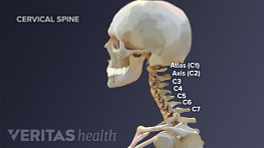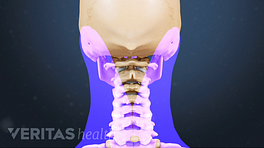We all know what it’s like to have neck pain, whether it’s from helping a friend move furniture into their new place or just waking up one day with a stiff neck.
Most cases of neck pain are due to muscle strains or ligament strains, which are small tears in the soft tissues that help support the cervical spine. Fortunately, these injuries tend to heal on their own within a week or so. But in the meantime, they can be painful.
If your neck hurts, here are some basic home remedies to find some relief.
Apply ice or heat. Either ice or heat can be applied to the neck for pain relief, depending on your preference. Ice tends to be good at stopping the injury’s initial inflammation and numbing pain. Heat tends to be good at relaxing muscles and helping nutrient-rich blood flow into the area to promote healing. Just be careful to limit applications to 20 minutes or less at a time and regularly check the skin to avoid tissue damage. Heat packs and ice packs are readily available at the store, or you can make them from common items at home, such as using a frozen bag of peas or pouring rice or oatmeal into a sock that can be microwaved.
Go easy for a day or two. When neck pain flares up, the body is letting you know something is wrong. If muscles, tendons, or ligaments have been overextended or overused, it makes sense to give them a rest. Limit or avoid neck movements that exacerbate the pain. However, after an initial rest period, try to get back to normal activity levels if possible. Too much rest can cause muscles to weaken and tighten, which can lead to more pain.
Gentle stretching or massage. If tolerated, try slowly stretching your neck to one side, and then the other. If you feel increased pain, you’re pushing too far. Some gentle stretching can help reduce tightness in the neck as you recover. You can also give your neck a light massage, or have a partner or willing friend do so. As long as the massage doesn’t increase pain, it can help relax muscles and improve blood flow.
Over-the-counter medications. Your medicine cabinet probably already has a pain reliever that can help. A few examples that might reduce neck pain include acetaminophen (such as Tylenol), aspirin (such as Bayer or Excedrin), and ibuprofen (such as Advil or Motrin). But even for non-prescription medications, remember to read drug labels carefully and follow directions to avoid potentially serious side effects. If you can, it’s ideal to find neck pain relief without taking medication.
For neck pain that lasts more than a couple of weeks or is accompanied by other troubling symptoms, such as fever, chills, or nausea, have it checked out by a doctor.
I hope the remedies we’ve discussed today add new resources to help relieve your neck pain. And as always, stay healthy.









